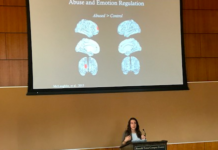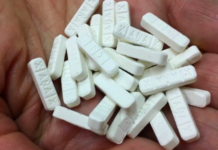New Study Finds That Lavender Extract Eases Anxiety
A new study in Frontiers in Behavioral Neuroscience has found that the smell of lavender extract has an anxiolytic effect.
Labels Initiates Core Social Support, Lose Peripheral Ties
Article Abstract:
Although research supports the stigma and labeling perspective, empirical evidence also indicates that a social safety net remains intact for those with mental...
Prozac Nation is Now the United States of Xanax
In this piece for The New York Times, Alex Williams discusses the social, political, cultural, and economic trends that have led to the recent rise in...
“California Moves to Stop Misuse of Psychiatric Meds in Foster Care”
On Tuesday, NPR told the story of DeAngelo Cortijo. DeAngelo became a foster kid at age 3 after his mother attempted suicide. He was “diagnosed with bipolar and anxiety disorders, attachment disorder, intermittent explosive disorder or posttraumatic stress disorder,” and was prescribed “a combination of antipsychotics, antidepressants and stimulants, and was told that taking them was his only hope of being normal.” Through equine therapy, DeAngelo was eventually able to get off all of his medication. Now, California is hoping to pass reforms that would prevent foster kids, like DeAngelo, from being “prescribed antipsychotic drugs at double to quadruple the rate of that not in foster care.”
Is Long-term Use of Benzodiazepines a Risk for Cancer?
A large study of the population in Taiwan reveals that long-term use of benzodiazepine drugs, commonly prescribed for anxiety, significantly increases the risk for brain, colorectal, and lung cancers. The research, published open-access in the journal Medicine, also identifies the types of benzodiazepines that carry the greatest cancer risk.
After the Black-Box: Majority of Children Starting SSRIs Still Receiving Too High of Dose
In 2004, the FDA added a black-box warning to SSRI antidepressants on the increased risk of suicide among children taking these drugs. A new study suggests that this warning has increased the proportion of children who begin an antidepressant on a low dose, but the majority are still receiving higher than recommended doses.
Familial Factors Affect Depression, BD, OCD, PD, and Phobias
A study of 566 families with 1416 bipolar-disordered members, and 675 families with 1726 depressed members by researchers from Johns Hopkins and the University...
Targets are Damaging Students’ Mental Health
In this piece for The Guardian, a schoolteacher explains how unrealistic expectations of students' academic performance as well as a strong emphasis on test scores have harmed students'...
Kids Diagnosed with Autism More Likely to Get Psychotropic Drugs
Children diagnosed with an Autism Spectrum Disorder (ASD) are much more likely to be prescribed a psychotropic medication.
“Cortisol Levels in Children’s Hair May Reveal Future Mental Health Risk”
The Guardian covers research out of Australia that found that levels of the “stress hormone” cortisol in the hair of 70 nine-year-old children corresponded to the number of traumatic events experienced by the child. “Childhood is an imperative and sensitive period of development, and when things go wrong it can have lifelong consequences, not just on mental health, but also on general health.”
“Drugs, Greed and a Dead Boy”
New York Times columnist, Nicholas Kristof, relates the story of Andrew Francesco, a boy who began taking Ritalin at age five and died from complications with Seroquel when he was fifteen. His father, a former pharmaceutical industry executive, reveals the industry’s greed in his memoir “Overmedicated and Undertreated.” Now the industry is pushing for a first-amendment right to market its drugs for off-label uses.
Seeking Justice
My life flashed before my eyes as my entire medical history over the last decade was rewritten from having a genetic brain disease to being a victim of a medical scam. It was bittersweet, for I realized that I was not sick and dying, but I had been robbed of so many years of my life due to the psychiatrist’s lies. Now I am suing my former psychiatrist for damages.
How Neglect and Abuse Change Children’s Brains
From the Center for Health Journalism: Different types of childhood adversity shape the developing brain in distinct ways and need to be addressed accordingly. While...
School-Based Program for Anxiety and Depression Shows Promise
Researchers evaluate the impact of a school-based prevention program on anxious and depressive symptoms.
“Children Today Suffer From a Deficit of Play”
Boston College Psychologist Peter Gray writes for Aeon about the impact of the gradual erosion of children’s’ play in the United States. “Over the...
Xanax: Children As Young As 11 Taking Anxiety Drug
From BBC: The abuse of the anti-anxiety drug Xanax is becoming widespread among children and adolescents as young as 11 years old.
"To gain an idea of the...
“Why Does Psychiatry So Often Get a Free Pass on Standards of Evidence?”
Rob Wipond takes HealthNewsReview.org to task for its coverage of a Philadelphia Inquirer article about a medical device designed for people experiencing panic. He writes that “hyperbolic psychiatric and psychological claims frequently get free passes from otherwise thoughtful medical critics.”
New Trial Finds Trauma-Focused Therapy Effective in Children
Trauma-focused cognitive behavioral therapy (Tf-CBT) is effective at reducing the symptoms associated with PTSD in children and adolescents, according to a new trial out...
Are Psychiatric Experiments on Primates Ethical — Or Even Truly Useful?
Pediatric psychiatrist Sujartha Ramakrishna describes a planned University of Wisconsin psychiatric experiment "to discover new therapies by dissecting and analyzing the brains of baby...
Video Games By Prescription Continue Developing
"Is this the future of medicine?" asks Stephen Armstrong in the British Medical Journal. "Little Artie has been left at the doorstep of his...
Omega-3 Screening for Psychiatric Symptoms?
There is a substantial body of evidence suggesting that not getting enough omega-3 fatty acids in your diet may be connected to a diverse array of psychiatric symptoms. In a new study published this month, psychiatrist Robert McNamara and Erik Messamore provide an overview of the evidence and call for screening of omega-3 deficiency in people experiencing symptoms associated with ADHD, depression, mood disorders, and psychosis.
In Case You Missed This
On November 12th, 2015, the third anniversary of the day that I abruptly stopped taking benzodiazepines, my dear friend, J. Doe, published a two-part article here on Mad in America examining the language that is commonly used to describe benzodiazepine (benzo) iatrogenesis. I wanted a summary of these articles captured in a Youtube video so that those in the thick of benzo neurotoxicity could tune into these ideas in a way that might be more easily digestible. I hoped more benzo sufferers would begin to question how they describe (and allow others to describe) an illness that remains decades behind in understanding and recognition. I also wanted to draw attention to the content again in hopes that more medical professionals would read and understand the crucial distinctions in language surrounding this problem.
Childhood Anxiety Disorders Are Treatable With Therapies
From MinnPost: According to psychologist Hal Pickett, childhood anxiety is best reduced through self-care and common-sense therapies such as getting enough sleep, maintaining a balanced...
Benzodiazepine Prescriptions Increase with Overdose Deaths
A recent article in the American Journal of Public Health calls for policy level interventions to reduce the use of benzodiazepines, drugs commonly prescribed...
SSRI Exposure in Pregnancy Alters Fetal Neurodevelopment
Alterations in gray matter and white matter development found in infants of mothers taking SSRI antidepressants during pregnancy.



















